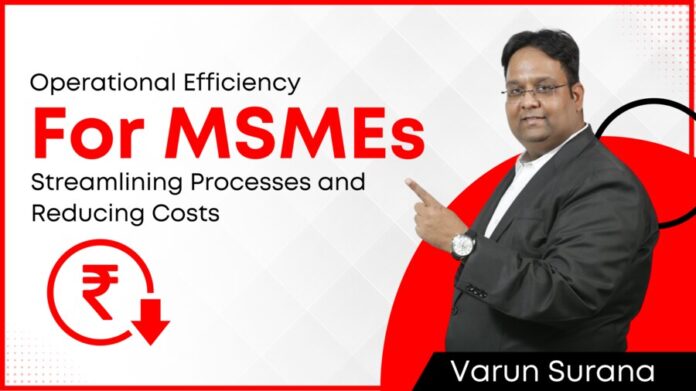Operational effectiveness has emerged as a key component of Micro, Small, and Medium Enterprises (MSMEs) success and sustainability in today’s fiercely competitive business environment. MSMEs must discover methods to simplify their operations and save expenses to stay competitive and increase profitability due to constrained resources and budgets. In this article, we’ll look at the value of operational efficiency for MSMEs and talk about how to get there.
The Significance of Operational Efficiency for MSMEs
Process Optimization: Streamlining Operations for Efficiency
- Analyzing current procedures and finding inefficiencies
Operational efficiency is the capacity of an organization to maximize productivity, reduce waste, and make efficient use of its resources. Operating efficiently is especially important for MSMEs since they sometimes have few resources and face fierce competition from larger businesses. MSMEs may increase productivity, raise customer happiness, and ultimately spur business development by simplifying operations and cutting expenses.
- Avoiding layoffs, obstacles, and extra steps
Process optimization is one of the major components of operational effectiveness. MSMEs must assess their current procedures rigorously and pinpoint any inefficient areas. Analyzing the full value chain, from production to marketing and customer service, is required for this. MSMEs may optimize their processes and conserve critical time and money by getting rid of bottlenecks, redundant stages, and ineffective procedures.
- Productivity and collaboration using technological solutions
Putting technology to use may significantly improve operational effectiveness. MSMEs may take advantage of low-cost, user-friendly software solutions to automate manual operations, increase data accuracy, and improve teamwork. Consider how implementing an enterprise resource planning (ERP) system may bring together different corporate processes like inventory control, sales, and accounting on a single platform. This saves time on administrative procedures while also giving decision-makers real-time information to help them make better choices.
- Using digital evolution to improve operations
MSMEs should use digital transformation to improve their business processes. Online distribution channels and e-commerce tools may aid MSMEs in growing their consumer base and streamlining their sales procedures. MSMEs may successfully advertise their goods or services, engage their target audience, and create leads at a lesser cost than traditional advertising techniques by using digital marketing strategies like search engine optimization (SEO) and social media advertising.
Supply Chain Management: Improving Value Chain Performance
- Establishing trusting relationships with suppliers and maximizing stock levels
- Using JIT (Just-in-Time) inventory management techniques
- Investigating other ways to source and negotiating better terms for the price
MSMEs may also increase operational effectiveness by managing their supply chains well. MSMEs can cut expenses related to stockouts and overstock by establishing trusting working relationships with suppliers and maximizing inventory levels. By using just-in-time (JIT) inventory management techniques, waste may be reduced and customer requests can be more quickly met. Significant cost reductions can also be achieved by investigating other sourcing possibilities and obtaining better price arrangements.
Outsourcing: Improving Efficiency by Handing Off Non-Core Tasks
- The Advantages of Contracting Out for MSMEs
- Accounting, IT support, and customer service are a few examples of outsourced tasks.
MSMEs have the option to outsource non-core functions to save costs and boost productivity. MSMEs can outsource tasks like accounting, IT support, or customer care to qualified service providers rather than attempting to manage every area of the firm internally. As a result, the company may save money and get access to knowledge while concentrating on its core skills.
Employee Development: Developing Competencies for Effectiveness
- Putting money into employee training to increase productivity
- Creating a Culture of Innovation and Continuous Growth
Enhancing operational efficiency also requires making significant investments in personnel training and development. Employees that have received proper training are more productive, flexible, and capable of handling jobs effectively. MSMEs should conduct frequent training sessions to advance technical abilities, soft abilities, and sector expertise. Additionally, encouraging employees to offer process improvements and cultivating a culture of continuous improvement may help create a workplace that is more inventive and productive.
Sustainable Methods: Effectiveness and Accountability
- Including Sustainable Practices to Reduce Costs and Improve Brand Image
- Responsible resource consumption, waste reduction, and energy efficiency
For MSMEs, implementing sustainable practices can increase operational effectiveness. Energy-efficient technology, waste reduction programs, and responsible resource usage not only cut expenses but also improve brand recognition and appeal to customers who care about the environment. Recycling initiatives, energy-efficient machinery, and eco-friendly packaging options are a few examples of sustainable company practices that may help save costs and enhance long-term profitability.
Conclusion
Operational Effectiveness’s Contribution to MSMEs’ Success
Operational effectiveness is essential to MSMEs’ success. MSMEs may increase productivity, save costs, and boost customer satisfaction by simplifying operations, utilizing technology, improving supply chain management, and investing in staff training. Other tactics that can boost operational efficiency include adopting ethical procedures, embracing the digital revolution, and outsourcing non-core tasks. MSMEs that place a high priority on operational efficiency are more likely to develop, succeed in a cutthroat market, and provide a strong basis for long-term success.
About The Author
Varun Surana is a dynamic author, speaker and business consultant who is boundlessly providing his business consultation services to the SME & MSME industry for years. Beyond his professional accomplishments, he shares keen knowledge of Digital Marketing with people through various mediums. He is well known for making a business start from scratch into a successful venture. His expertise will guide you through any hurdle and will make your business outshine in this digital era. He’s actively assisting other professionals through consultation and positive suggestions while sharing his ideas and encouraging others to achieve their aspirations. Starting 5 successful businesses all by himself, he holds a vast amount of expertise and a wide network. Varun Surana is making significant contributions to the entrepreneurial world.


